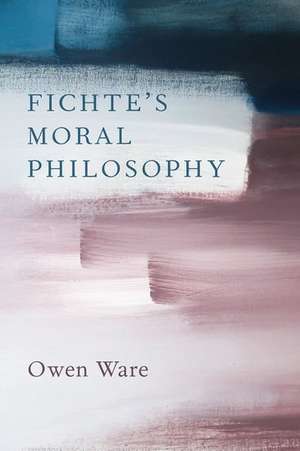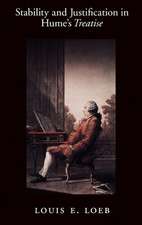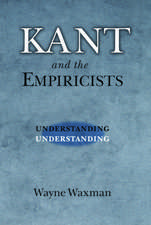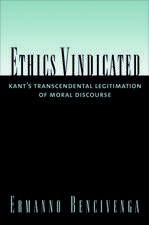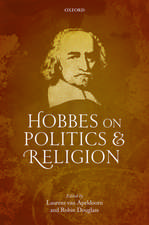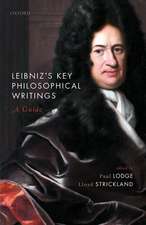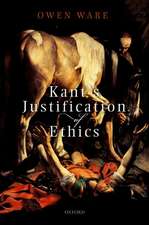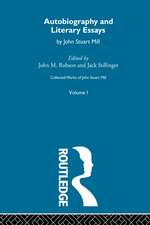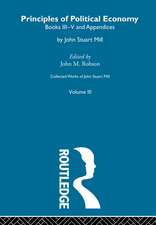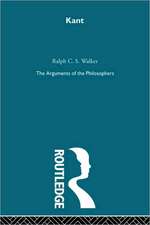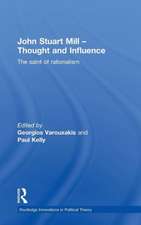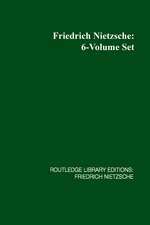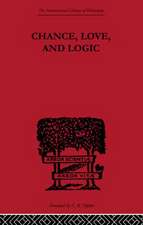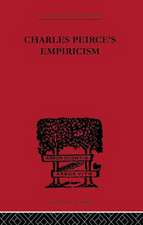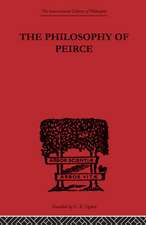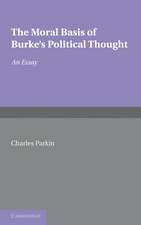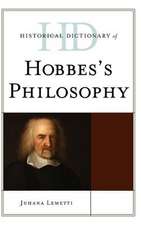Fichte's Moral Philosophy
Autor Owen Wareen Limba Engleză Hardback – 17 noi 2020
Preț: 517.00 lei
Preț vechi: 612.94 lei
-16% Nou
Puncte Express: 776
Preț estimativ în valută:
98.93€ • 103.29$ • 81.88£
98.93€ • 103.29$ • 81.88£
Carte tipărită la comandă
Livrare economică 24-31 martie
Preluare comenzi: 021 569.72.76
Specificații
ISBN-13: 9780190086596
ISBN-10: 0190086599
Pagini: 262
Dimensiuni: 236 x 157 x 23 mm
Greutate: 0.54 kg
Editura: Oxford University Press
Colecția OUP USA
Locul publicării:New York, United States
ISBN-10: 0190086599
Pagini: 262
Dimensiuni: 236 x 157 x 23 mm
Greutate: 0.54 kg
Editura: Oxford University Press
Colecția OUP USA
Locul publicării:New York, United States
Recenzii
Fichte's Moral Philosophy is a major contribution not just to Fichte scholarship but to normative ethical theory as such. Specialists will be impressed by Ware's meticulous scholarship and familiarity with all the relevant primary and secondary literature, as well as by his judicious engagement with (as well as anticipation of) opposing interpretations of Fichte's moral philosophy...It is a rare pleasure to encounter a treatise as well written, carefully argued, and broadly informed as this landmark contribution to both Fichte studies and ethical theory.
Owen Ware's book...is a first-class contribution to the Fichte scholarship...It will be a staple of the conversation on Fichte for years to come.
This is simply an exceptional book, clearly written and argued and a delight to read. It is required reading for anyone interested in German Idealism or in normative ethics in general.
Ware has opened a line of interpretation that presents a less austere Fichte, a Fichte for whom we are fully embodied and situated in a world. The ethics of wholeness Ware emphasizes will be congenial to many contemporary philosophers. Fichte's Moral Philosophy should become a key text in coming years, and I look forward to seeing how Fichte scholarship builds upon this work.
Owen Ware's book is impressively multifaceted... This is a splendid study: historically informed, neatly organized, carefully argued, and on many points appreciably innovative... Specialists in Kantian moral philosophy and post-Kantian thought need to read this book; so, too, should anyone interested in conceptually creative, incisive ethical thinking along distinctly post-Kantian (and pre-Hegelian) lines.
Ware's aim in this book is to rectify this. From the start, his goal in this masterful addition to Anglophone literature on Fichtean ethics is to reaffirm theimportance of Fichte's appeal to the original fundamental unity from which we are alienated, and the ethical vocation of the individual as a project of strivingtowards this unity.
Ware's work dually serves as a clear and engaging exegetical work, that both situates and clarifies the minutiae of Fichte's moral theory against a rich background of post-Kantian thought, and as an erudite contribution to scholarly interpretation. Fichte's Moral Philosophy is an exemplar in modern Fichte scholarship whose consequences will, I expect, continue to reverberate for years to come.
Fichte's Moral Philosophy is, to conclude, an exemplar in modern Fichte scholarship whose consequences will, I expect, continue to reverberate for years to come.
Owen Ware's book...is a first-class contribution to the Fichte scholarship...It will be a staple of the conversation on Fichte for years to come.
This is simply an exceptional book, clearly written and argued and a delight to read. It is required reading for anyone interested in German Idealism or in normative ethics in general.
Ware has opened a line of interpretation that presents a less austere Fichte, a Fichte for whom we are fully embodied and situated in a world. The ethics of wholeness Ware emphasizes will be congenial to many contemporary philosophers. Fichte's Moral Philosophy should become a key text in coming years, and I look forward to seeing how Fichte scholarship builds upon this work.
Owen Ware's book is impressively multifaceted... This is a splendid study: historically informed, neatly organized, carefully argued, and on many points appreciably innovative... Specialists in Kantian moral philosophy and post-Kantian thought need to read this book; so, too, should anyone interested in conceptually creative, incisive ethical thinking along distinctly post-Kantian (and pre-Hegelian) lines.
Ware's aim in this book is to rectify this. From the start, his goal in this masterful addition to Anglophone literature on Fichtean ethics is to reaffirm theimportance of Fichte's appeal to the original fundamental unity from which we are alienated, and the ethical vocation of the individual as a project of strivingtowards this unity.
Ware's work dually serves as a clear and engaging exegetical work, that both situates and clarifies the minutiae of Fichte's moral theory against a rich background of post-Kantian thought, and as an erudite contribution to scholarly interpretation. Fichte's Moral Philosophy is an exemplar in modern Fichte scholarship whose consequences will, I expect, continue to reverberate for years to come.
Fichte's Moral Philosophy is, to conclude, an exemplar in modern Fichte scholarship whose consequences will, I expect, continue to reverberate for years to come.
Notă biografică
Owen Ware is Assistant Professor at the University of Toronto. He has published extensively on Kant and post-Kantian philosophy, with a focus on questions of freedom, morality, and normativity. He is the author of Kant's Justification of Ethics, forthcoming from Oxford University Press.
